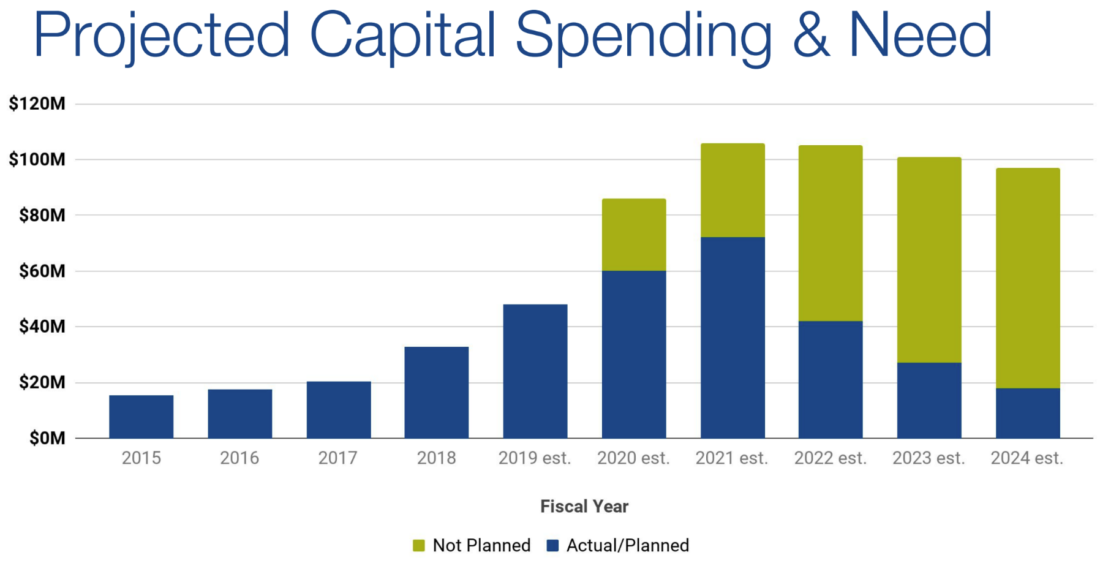The way City Manager Debra Campbell, speaking at City Council’s April 9 budget work session, described Asheville’s search for funding evoked the image of a late-night scramble among the couch cushions for drive-thru money. “We are looking under every rock, every pillow, everywhere we can find to see if we can do as much and as many of those things as possible,” she said. “We’ve been struggling.”
With the city’s major anticipated source of new money, the property and sales taxes resulting from the sale of Mission Health to for-profit HCA Healthcare, coming in at half of initial estimates for fiscal year 2019-20 — $2.5 million instead of $5 million, according to the Buncombe County tax office — Campbell explained that Council members would have to curb their initial spending plans for fiscal year 2020 and beyond. Moving forward, she and other officials stressed the importance of additional revenue streams to meet city needs.
City Chief Financial Officer Barbara Whitehorn proposed that Asheville institute a program of regularly issued general obligation bonds to support capital improvement projects. Staff has identified $330 million in currently unfunded capital needs through fiscal year 2024, she said, and many partially funded projects will require significantly more money than expected.
Whitehorn noted that the new Fire Station 13 on Broadway, which would also provide space for a police substation and an emergency operations center, is now projected to cost $11.4 million — $8 million over its current $3.4 million budget. “Additional investment in capital is really essential to providing our core services, and that routine bond program addresses the gap between investments and resources,” she said.
According to state law, bond referendums can only be placed on the ballot in association with a regular election. The General Assembly changed Asheville’s municipal elections from odd to even years when it imposed districts on the city in June, meaning that residents could not vote on any new bonds until 2020 at the earliest.
Regarding the city’s operating budget, Council member Julie Mayfield pointed out that Asheville wouldn’t have to wait for new money if the property tax rate were increased. “It feels to me like we’re not talking about an obvious solution,” she said. “I just don’t think we should keep kicking the can down the road and starving ourselves.”
But others on Council were less than enthusiastic about the prospect of a tax hike. Keith Young, referencing his remarks at the group’s March retreat, said he wouldn’t support an increase, while Mayor Esther Manheimer said higher property taxes seemed “like a sledgehammer” of a tool to cover immediate city spending goals.
Council member Vijay Kapoor countered that Mayfield should give more thought to cutting current city programs before proposing higher taxes. “I would have a very hard time supporting that without you spending a lot of time going through and asking, ‘Are we doing things right now that we shouldn’t be doing?’” he said.
With economists pegging the threat of a recession within the next year at its highest level since 2008, Kapoor added, now is not the time to increase Asheville’s spending. “When that rainy day hits, and it will, we’re going to be in a tougher spot,” he said.
Campbell agreed with those remarks: “With the economy progressing the way that it is, it could storm.”




This graph shows that our leaders are not capable of running this city. I can honestly say That fire station on Broadway isn’t necessary, just more irresponsible spending. Government also makes this city unaffordable.
The State did not “impose” a change of election years in Asheville. Mayor Manheimer asked Senator Edwards to include that change in the bill that changed our electoral structure from the at-large system to the more inclusive and racially beneficial district system. The Mayor made the request, Senator Edwards agreed to it, Senator VanDuyn wrote the amendment, and City Council got what they wanted by changing the election cycle to even numbered years. Now, Council members can more easily climb the political ladder by not having to abandon ship in before their Council term has expired in order to run for higher office, and Julie Mayfield is making the most of that change by running for the NC Senate seat that will be open in 2020 when Senator VanDuyn runs for Lieutenant Governor. If this change had not been GRANTED to Council, Julie Mayfield would have had to either not run for re-election in this year and wait until 2020 to run for Senate, or she could have run for re-election and jump ship after one year into her second term on Council.
That’s what happened.
https://youtu.be/cJgyQ-i599s
Here’s the video of Mayor Manheimer explaining how the election cycle was changed.
This council is a piece of work. Conniving as hell, aren’t they? Not a good look to have.
My property taxes are already like 30% of my monthly house payment… , maybe look elsewhere instead of endlessly raising property taxes, they went up over 30% two years ago as well, enough is enough
Could always tax religious organizations which consume tons of resources, like police officers to direct traffic, while contributing nothing to their local communities except “thoughts and prayers,” which we as a nation probably have enough of.